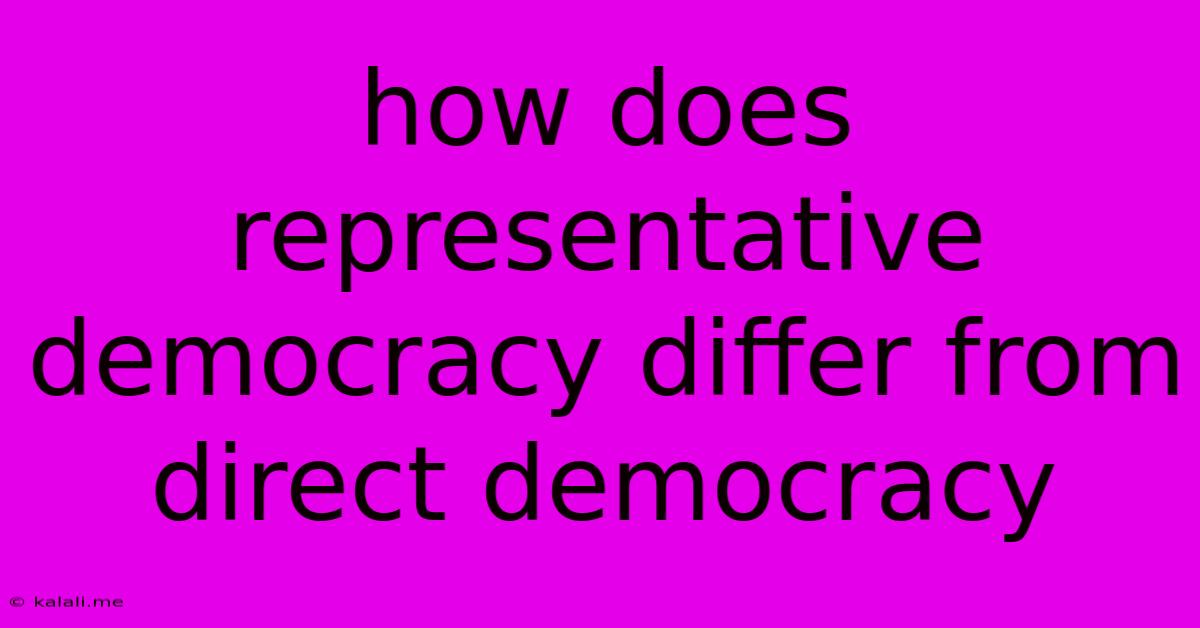How Does Representative Democracy Differ From Direct Democracy
Kalali
Jun 14, 2025 · 3 min read

Table of Contents
How Does Representative Democracy Differ From Direct Democracy?
Understanding the nuances between representative and direct democracy is crucial for comprehending how modern political systems function. While both aim to empower the people, they achieve this goal through vastly different mechanisms. This article will delve into the core differences, exploring the advantages and disadvantages of each system. Choosing the right system for a country often depends on its size, population diversity, and cultural context.
Representative Democracy: The Voice of the People, Filtered Through Representatives
In a representative democracy, citizens elect representatives to make decisions on their behalf. These representatives, typically members of parliament or congress, are responsible for formulating and enacting laws, policies, and budgets. This system is the most prevalent form of democracy globally. The power resides with the electorate, but its exercise is indirect. Think of the United States, Canada, or the United Kingdom – these are all prime examples of representative democracies.
Key Characteristics of Representative Democracy:
- Elected Officials: Citizens vote for individuals to represent their interests in the legislative body.
- Regular Elections: Elections are held at regular intervals to ensure accountability and allow for changes in representation.
- Political Parties: Political parties usually play a significant role in organizing the political process and presenting policy platforms.
- Separation of Powers: Power is often divided among different branches of government (legislative, executive, judicial) to prevent tyranny.
- Checks and Balances: Mechanisms are in place to limit the power of each branch and ensure they operate within constitutional boundaries.
Advantages of Representative Democracy:
- Efficiency: Dealing with complex issues is more efficient with a smaller group of elected officials making decisions.
- Expertise: Elected officials can specialize in policy areas, leading to potentially better-informed decisions.
- Accountability: Regular elections hold representatives accountable to the electorate.
- Stability: The system is less prone to sudden shifts in policy due to the filtering process of elected representatives.
Disadvantages of Representative Democracy:
- Lack of Direct Influence: Citizens have limited direct influence on day-to-day governance.
- Potential for Corruption: The potential for corruption and abuse of power exists within the representative body.
- Ineffective Representation: Representatives may not always accurately reflect the views of their constituents.
- Political Polarization: Strong partisan divides can lead to gridlock and hinder effective governance.
Direct Democracy: The People Decide Directly
Direct democracy, also known as pure democracy, involves citizens directly participating in the decision-making process. This typically involves voting directly on policies and laws, rather than electing representatives to do so. While less common on a national scale, direct democracy features prominently in certain contexts, such as referendums and citizen initiatives at a local level. Switzerland, with its frequent referendums, provides a relatively modern example of a system incorporating elements of direct democracy.
Key Characteristics of Direct Democracy:
- Citizen Participation: Citizens directly participate in the decision-making process.
- Referendums and Initiatives: Policies are decided through referendums (votes on specific proposals) or citizen initiatives (proposals put forward by citizens themselves).
- Transparency: Decisions are made openly and directly by the people.
- Potential for Complexity: Managing complex issues through direct democracy can be challenging.
Advantages of Direct Democracy:
- Increased Citizen Engagement: Higher levels of citizen participation and engagement in political processes.
- Greater Accountability: Direct accountability of government to the people.
- Enhanced Legitimacy: Policies are directly approved by the people, enhancing their legitimacy.
Disadvantages of Direct Democracy:
- Inefficiency: Dealing with complex policy issues can be slow and inefficient with large-scale direct participation.
- Tyranny of the Majority: The rights of minorities may be overlooked in favor of the majority's will.
- Lack of Expertise: Citizens may lack the expertise needed to make informed decisions on complex matters.
- Vulnerability to Manipulation: Direct democracy can be vulnerable to manipulation through propaganda and misinformation campaigns.
Conclusion: A Spectrum of Democratic Systems
The distinction between representative and direct democracy highlights a spectrum of approaches to governance. Most modern nations utilize a hybrid system, combining elements of both. While representative democracy provides efficiency and expertise, direct democracy offers greater citizen involvement and accountability. Understanding the strengths and weaknesses of each system is essential for evaluating the effectiveness and fairness of different political structures.
Latest Posts
Latest Posts
-
The Mass Per Unit Volume Of A Substance Is Called
Jun 15, 2025
-
What Is The Opposite Of Dangerous
Jun 15, 2025
-
Which Of The Following Is A Mechanical Wave
Jun 15, 2025
-
Is Dcm More Dense Than Water
Jun 15, 2025
-
Parts Of Four Stroke Petrol Engine
Jun 15, 2025
Related Post
Thank you for visiting our website which covers about How Does Representative Democracy Differ From Direct Democracy . We hope the information provided has been useful to you. Feel free to contact us if you have any questions or need further assistance. See you next time and don't miss to bookmark.